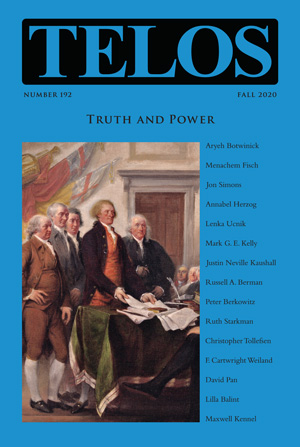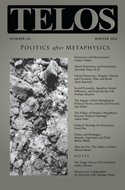By Aryeh Botwinick · Friday, November 13, 2020 Aryeh Botwinick’s “Negative Theology, Power, and the Israeli–Palestinian Conflict” appears in Telos 192 (Fall 2020): Truth and Power. Read the full article at the Telos Online website, or purchase a print copy of the issue in our online store. Individual subscriptions to Telos are available in both print and online formats.
 From a Machiavellian perspective, peace is war by other means. You can have a much greater watchful vigilance of your former (or future) opponent in times of peace than in a time of war. Israel as a sponsor (or co-sponsor) of a kind of Middle East Marshall Plan: Rebuilding your enemy so that he becomes your ally and friend. Enemies must learn to use each other’s weapons. The weakness of the Palestinians has to be matched by the deliberate, self-consciously generated weakness of the Israelis in the form of benevolence and generosity in order for both sides to emerge as triumphant. If this approach is pursued, the Israeli–Palestinian conflict harbors the prospect of turning into a sum-sum conflict, where both sides stand equally to gain by pursuing peace. From a Machiavellian perspective, peace is war by other means. You can have a much greater watchful vigilance of your former (or future) opponent in times of peace than in a time of war. Israel as a sponsor (or co-sponsor) of a kind of Middle East Marshall Plan: Rebuilding your enemy so that he becomes your ally and friend. Enemies must learn to use each other’s weapons. The weakness of the Palestinians has to be matched by the deliberate, self-consciously generated weakness of the Israelis in the form of benevolence and generosity in order for both sides to emerge as triumphant. If this approach is pursued, the Israeli–Palestinian conflict harbors the prospect of turning into a sum-sum conflict, where both sides stand equally to gain by pursuing peace.
Continue reading →
By Aryeh Botwinick · Friday, January 11, 2013 Aryeh Botwinick’s “Liberal Democracy, Negative Theory, and Circularity: Plato and Rawls” appears in Telos 161 (Winter 2012). Read the full version online at the Telos Online website, or purchase a print copy of the issue in our store.
 This paper argues that the best kind of philosophical defense of democracy is one that is worked out within the framework of negative theory. The phrase “negative theory” is being used on analogy with the term negative theology. Just as negative theology argues that we can only indefinitely say what God is not but cannot pinpoint in a positive sense what He is, so, too, negative theory advocates that we can only ceaselessly explore and highlight the limitations of reason, without being able to arrive at a positive content that is incontrovertible and uncontestable. This paper argues that the best kind of philosophical defense of democracy is one that is worked out within the framework of negative theory. The phrase “negative theory” is being used on analogy with the term negative theology. Just as negative theology argues that we can only indefinitely say what God is not but cannot pinpoint in a positive sense what He is, so, too, negative theory advocates that we can only ceaselessly explore and highlight the limitations of reason, without being able to arrive at a positive content that is incontrovertible and uncontestable.
Continue reading →
By Aryeh Botwinick · Saturday, September 23, 2006 A very cogent point of departure for assessing the competing nationalisms of the Israelis and the Palestinians is provided by two of the key architects of philosophical liberalism—Thomas Hobbes and David Hume. Both Hobbes and Hume emphasize that linking the legitimacy of nations to the circumstances of their origin will not bear critical scrutiny. Most nations are born in the throes of engagement in acts of violence against other people—indigenous populations, neighboring states, distant powers with imperialistic ambitions, etc. If the group seeking to establish hegemony over a certain territory emerges triumphant in its confrontation with any one of these (or similar) adversarial forces, it immediately dresses-up its successful assertion of “might” as “right,” and begins to see itself and to address others in the idiom of national self-determination. It rationalizes conquest and suppression as justice—and re-starts its history under the auspices of a transformed national identity.
Continue reading →
|
|
 From a Machiavellian perspective, peace is war by other means. You can have a much greater watchful vigilance of your former (or future) opponent in times of peace than in a time of war. Israel as a sponsor (or co-sponsor) of a kind of Middle East Marshall Plan: Rebuilding your enemy so that he becomes your ally and friend. Enemies must learn to use each other’s weapons. The weakness of the Palestinians has to be matched by the deliberate, self-consciously generated weakness of the Israelis in the form of benevolence and generosity in order for both sides to emerge as triumphant. If this approach is pursued, the Israeli–Palestinian conflict harbors the prospect of turning into a sum-sum conflict, where both sides stand equally to gain by pursuing peace.
From a Machiavellian perspective, peace is war by other means. You can have a much greater watchful vigilance of your former (or future) opponent in times of peace than in a time of war. Israel as a sponsor (or co-sponsor) of a kind of Middle East Marshall Plan: Rebuilding your enemy so that he becomes your ally and friend. Enemies must learn to use each other’s weapons. The weakness of the Palestinians has to be matched by the deliberate, self-consciously generated weakness of the Israelis in the form of benevolence and generosity in order for both sides to emerge as triumphant. If this approach is pursued, the Israeli–Palestinian conflict harbors the prospect of turning into a sum-sum conflict, where both sides stand equally to gain by pursuing peace.  This paper argues that the best kind of philosophical defense of democracy is one that is worked out within the framework of negative theory. The phrase “negative theory” is being used on analogy with the term negative theology. Just as negative theology argues that we can only indefinitely say what God is not but cannot pinpoint in a positive sense what He is, so, too, negative theory advocates that we can only ceaselessly explore and highlight the limitations of reason, without being able to arrive at a positive content that is incontrovertible and uncontestable.
This paper argues that the best kind of philosophical defense of democracy is one that is worked out within the framework of negative theory. The phrase “negative theory” is being used on analogy with the term negative theology. Just as negative theology argues that we can only indefinitely say what God is not but cannot pinpoint in a positive sense what He is, so, too, negative theory advocates that we can only ceaselessly explore and highlight the limitations of reason, without being able to arrive at a positive content that is incontrovertible and uncontestable. 






